The thought of setting foot on the African continent for the first time had always been somewhat daunting to me. As much as it pains me to say it, my pre-conceived notions about Africa, which weren’t necessarily the most positive, had always held me back from planning a trip.
But as an avid traveller who was no stranger to taking on new experiences, I knew that I’d eventually have to face up to these uncertainties and explore Africa for myself. So when the time came to plan a crazy Aeroplan-inspired trip around the world, I took a leap of faith and booked myself a three-day stopover in Accra, Ghana.
Why Ghana? Well, I had wanted my first visit to Africa to expose me to as many new surroundings as possible, instead of “playing it safe” by going somewhere like South Africa, where the strong European influence remains familiar.
At the same time, though, I’m obviously wary of safety along my travels, so I’m not going to waltz into Sudan or the DR Congo with my DSLR camera around my neck. Ghana enjoys a leading reputation among African nations in many areas of human development, and is also known as being one of the safest countries in the West Africa region, so I decided that Accra, the capital, would be the ideal place for me to visit on my maiden trip to Africa.
Plus, I got to fly a few interesting airlines on the way there, and there’s also a Marriott hotel close to the airport where I could redeem my points. What more did I want?
A friend of mine had introduced me to his friend, Kennedy, who lives and works in Accra, and Kennedy had graciously decided to act as my tour guide for the weekend that I was in town. I’m very grateful for that, because without Kennedy to show me around, I would’ve been lucky to see and discover a fraction of the things that I actually did!
I met up with Kennedy on the first morning, and I’ll walk you through what we got up to over the course of my three-day visit.
Day 1: Osu – The City Centre
The first day was spent exploring the Osu area, which can be described as the commercial centre of Accra. Located about a 20-minute drive from the airport and not far from the coastline, Osu is the capital’s beating heart, and is where the most cosmopolitan restaurants, bars, and new housing developments can be found.
Before heading into town, Kennedy and I first paid a visit to the La Tante DC-10 Restaurant, which is a rather bizarre eatery housed within an abandoned McDonnell-Douglas DC-10 aircraft, parked not too far from Accra’s real Kotoka International Airport, meaning that it was right around the corner from the Marriott hotel.
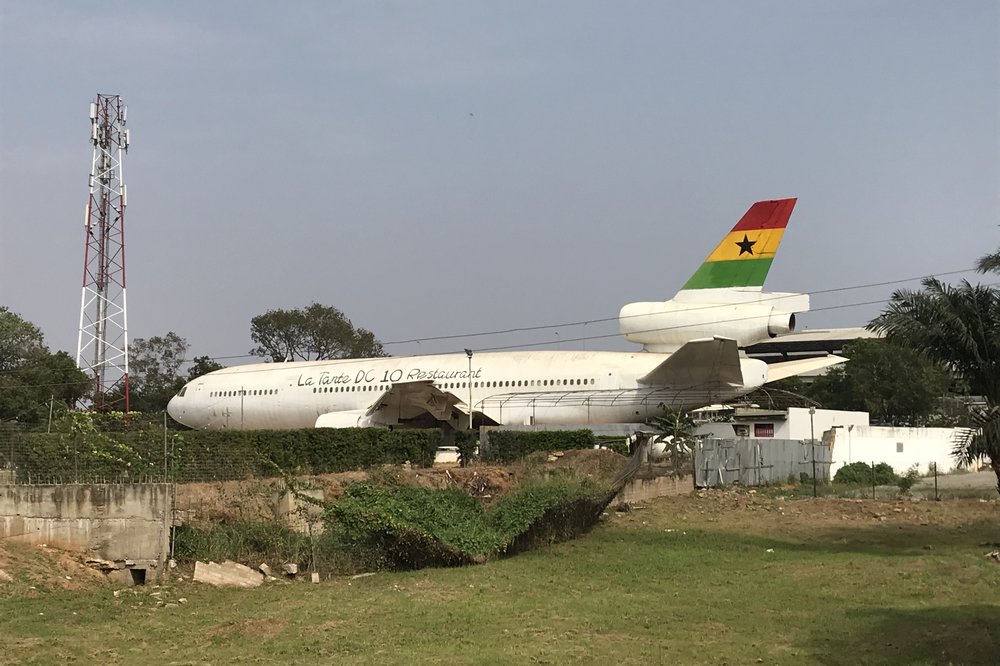
La Tante DC-10 Restaurant – Exterior
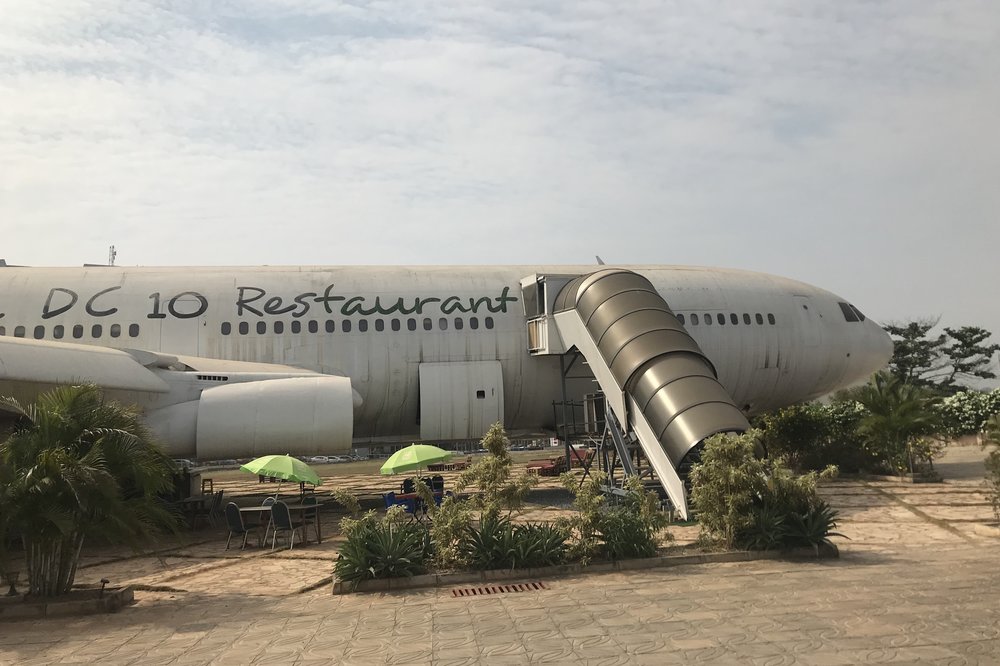
La Tante DC-10 Restaurant – Exterior
The DC-10 used to be operated by Ghana Airways until the airline went bankrupt and the plane was left parked at the airport. After various parts of the plane were sold for scrap, the La Tante restaurant chain purchased it, fitting it with a row of dining tables along each side of the fuselage and serving local Ghanaian specialties along with a wide range of drink options.
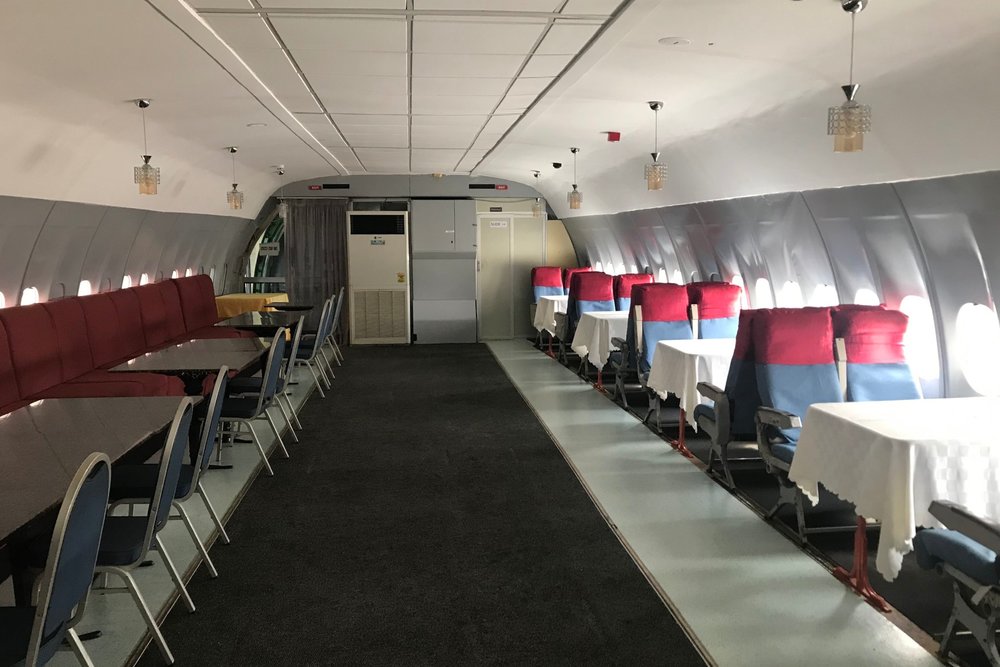
La Tante DC-10 Restaurant – Seating
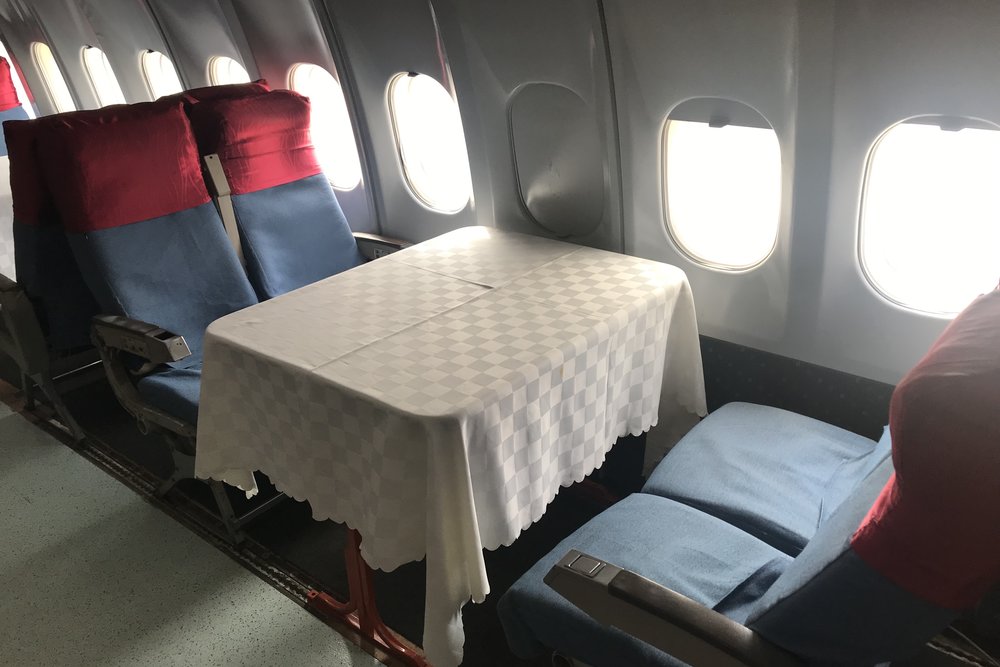
La Tante DC-10 Restaurant – Seating
Since I had just eaten a huge breakfast at the hotel, we thought we’d just get a beer in the restaurant for the novelty of it, but we were told that only dining patrons were allowed to sit inside the aircraft itself. If we only wanted to drink, we had to sit in the shaded area outside, underneath the fueslage.
And so we ordered some beef kebab to share, to go along with our beers. The kebab was spicy – and I say this as someone who loves spicy foods. Africans arguably love their spices even more than Asians, and even Kennedy was struggling to deal with the heat!
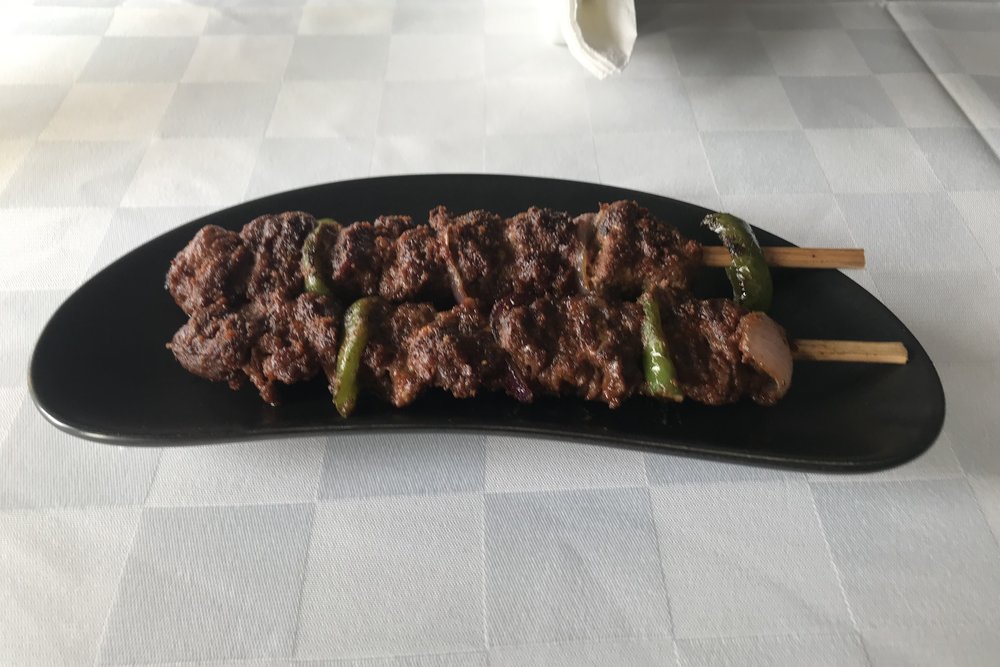
A different kind of airplane meal…
After being treated to a rather odd introduction to the country, we drove into town to check out what the Osu neighbourhood was getting up to on this Friday night. First, we stopped by Kennedy’s girlfriend’s place; after that, since Kennedy knew I was into fancy hotels, he brought me to the Kempinski Accra to see what one of the city’s most upscale lodging options was like.
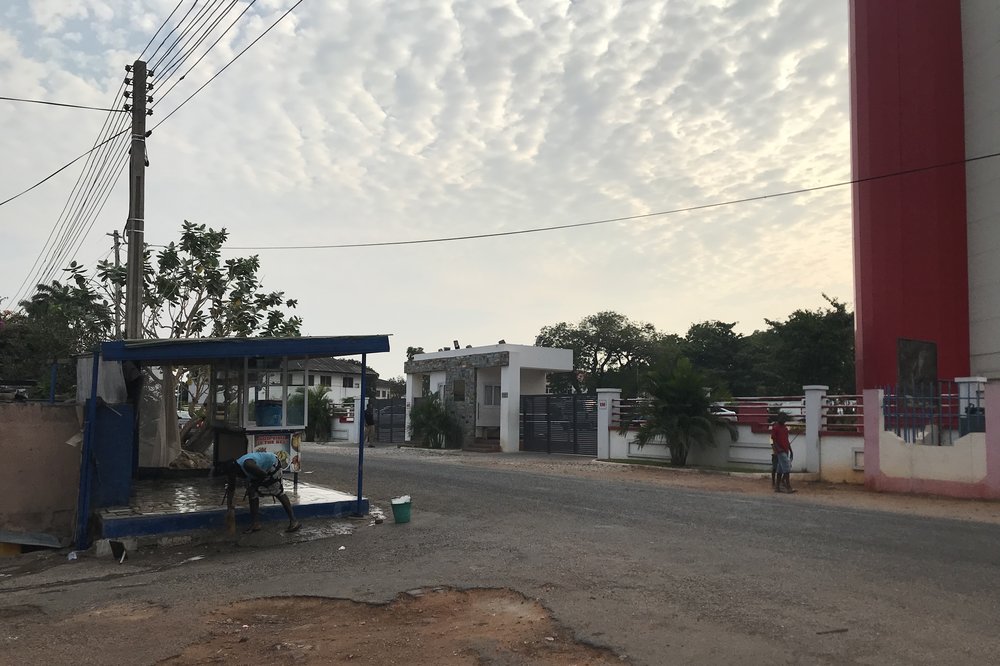
Street scene in Osu
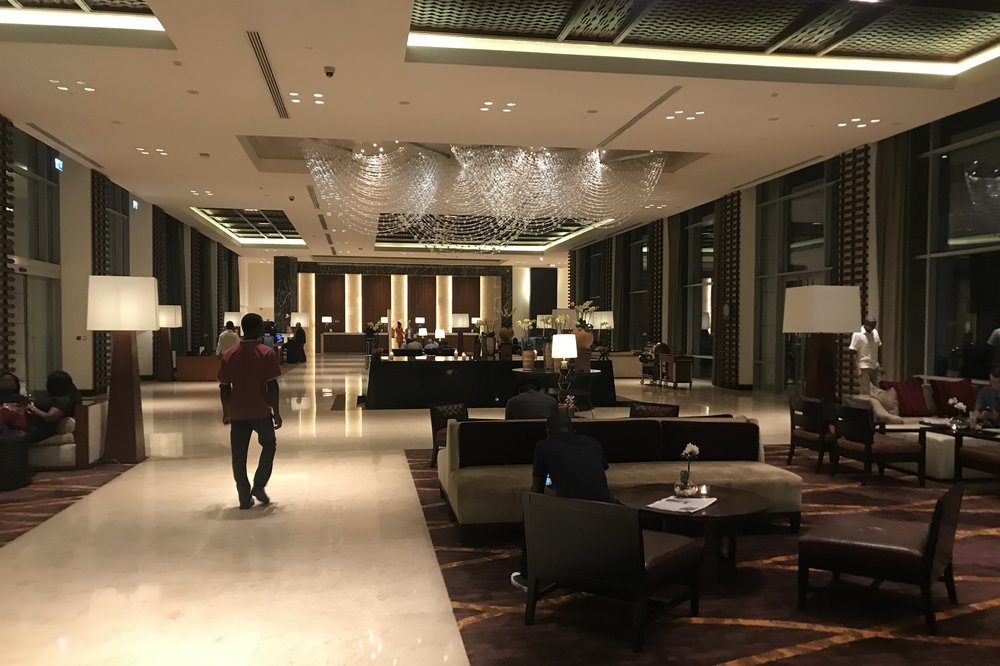
Kempinski Accra – Lobby
Needless to say, the Kempinski had a very nice ambience, both in the lobby lounge and upstairs by the outdoor pool. This place very much caters to Western tourists, though, and the prices reflect that – I ordered a cappuccino to perk me up in my jet-lagged afternoon state, and it cost me 25 Ghanaian cedis ($5)!
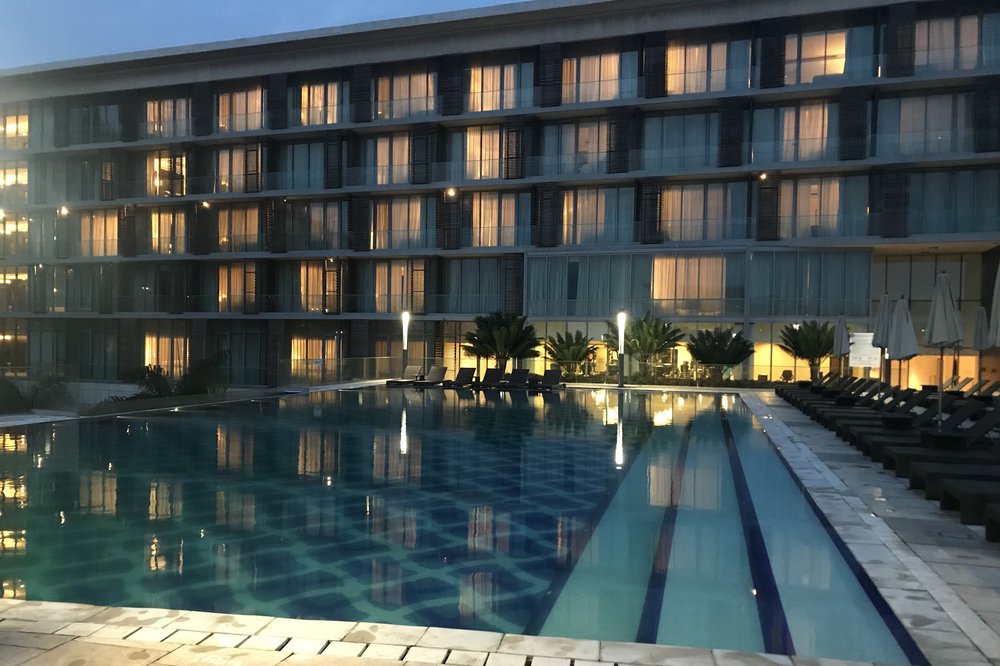
Kempinski Accra – Outdoor pool
There was a big football match that night: Arsenal v Manchester United in the FA Cup. As opposing fans of the two teams (which happen to be among the two most well-supported clubs in football-mad Ghana), Kennedy and I trash-talked our way to the raucous outdoor bar where the locals gather to watch the match, with his Manchester United side eventually shutting me up with a 2–0 victory.
That set the tone for our next destination: The Republic, a trendy bar in the middle of Osu that’s popular with Accra’s expatriate population. As someone who used to run in the expat circles when I lived in Beijing, this was exactly my favourite kind of spot, and pretty soon the drinks – including some particularly strong local concoctions – began flowing freely.
The outdoor patio blasted the latest Afro-pop hits all night, and I had the best time swaying along pretending to know the words.
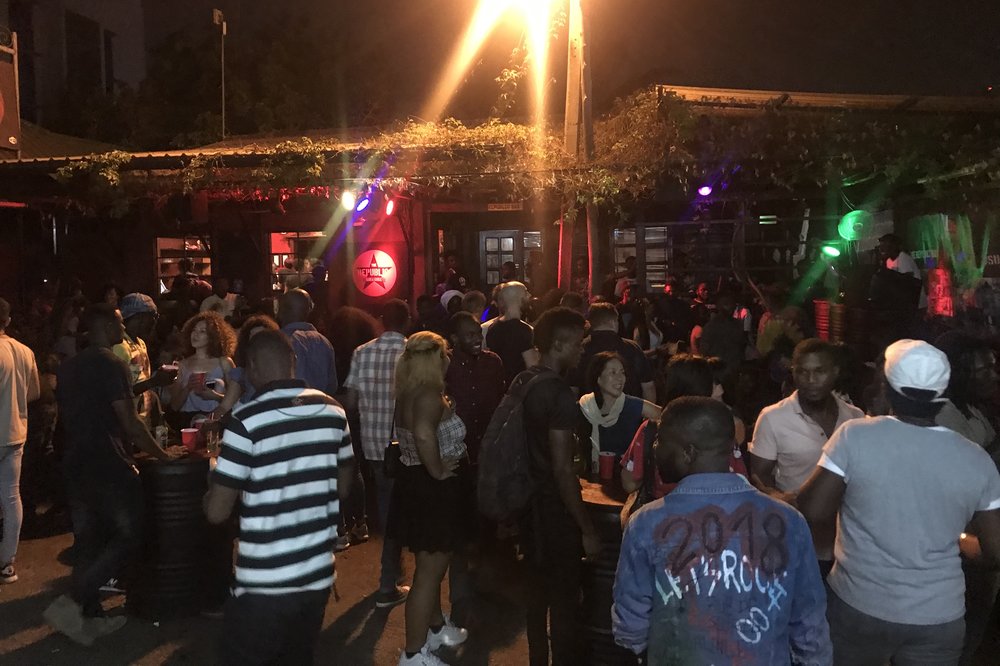
Friday nights at the Republic
Day 2: Jamestown – The Fishing Harbour
After coming back late to the hotel the previous night, we didn’t get started until noon the next day. The plan for the day was to visit Jamestown, the centre of the old colonial parts of Accra, before checking out a few other major points of interest.
As someone who’s travelled around Europe a fair bit, the words “old town” bring about images of charming cobblestone streets and castles on top of hills. But I couldn’t have been more misguided about the “old town” here in Accra, where the British, Danish, Dutch, and German colonizers at various points in history had built their forts along the coastline and swiftly abandoned them, leaving the local communities in tatters for generations to come.
Jamestown refers to the specific site of the British territory in Accra, but also acts as a generic term for all of the communities built around the many dilapidated colonial forts along the Accra coastline. In this part of town, the villages blend into one another, and the streets don’t necessarily have names – in fact, they’re lucky if they have a discernible beginning and end!
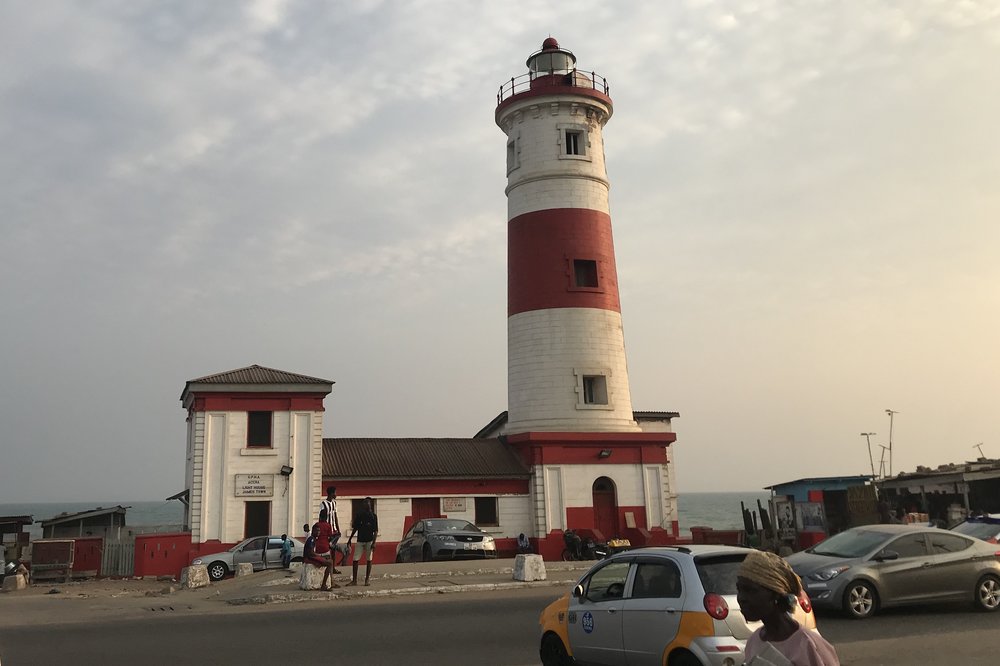
Jamestown Lighthouse
The Jamestown Lighthouse therefore acts as the default meeting place in this sprawling neighbourhood, and it was here that we met Emmanuel, a friend of a friend of Kennedy’s who would be our tour guide for the morning. I honestly cannot imagine getting to see Jamestown without the help of a local, because my foreign face would stand out like the sorest of thumbs.
We embarked on the first stop on our tour, a short walk from the lighthouse down to the beach. And I was genuinely shocked by what I saw.
While most of Jamestown’s residents at least have the privilege of living on solid ground, an even more marginalized group of people are forced to live on the beach itself, earning their keep by fishing on the open seas in the dead of night.
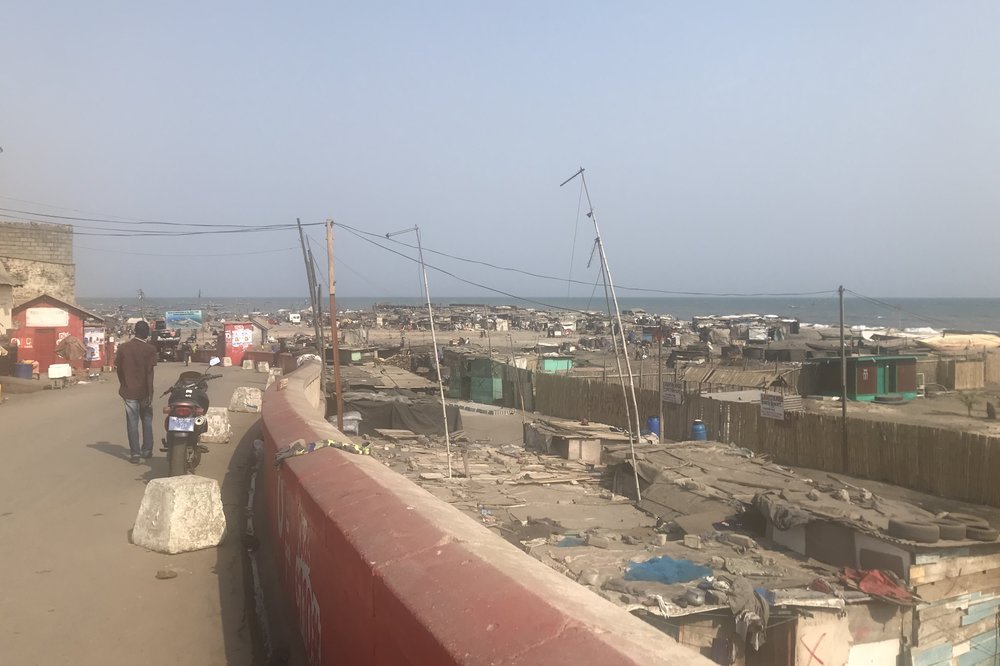
Jamestown fishing harbour
Around midnight every night, the fishermen take their wooden boats hundreds of metres into the open Atlantic Ocean, bringing home their catch by sunrise in time to host a haphazard early-morning fish market on the beach with the help of their families.
It’s a harsh set of circumstances, but I admired the resilience and spirit of these people, which could be seen in the various designs they incorporated in their fishing fleets. I thought the boats made for a nice setting for a photo op, but upon further reflection, it didn’t quite feel right to take too many pictures in the midst of such abject poverty, so I only snapped a few.
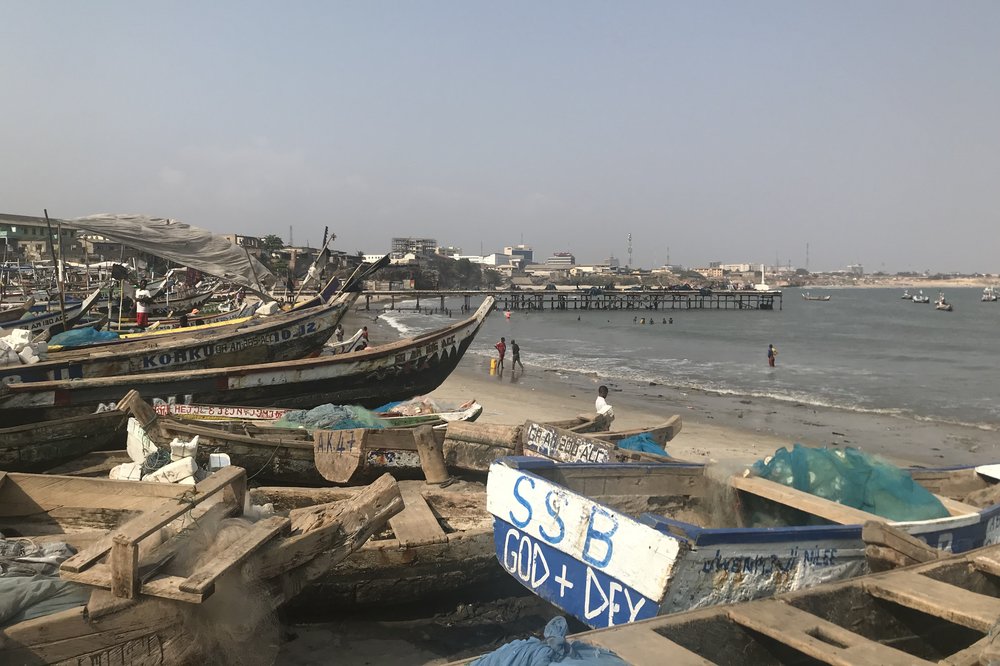
Jamestown fishing harbour – Boats
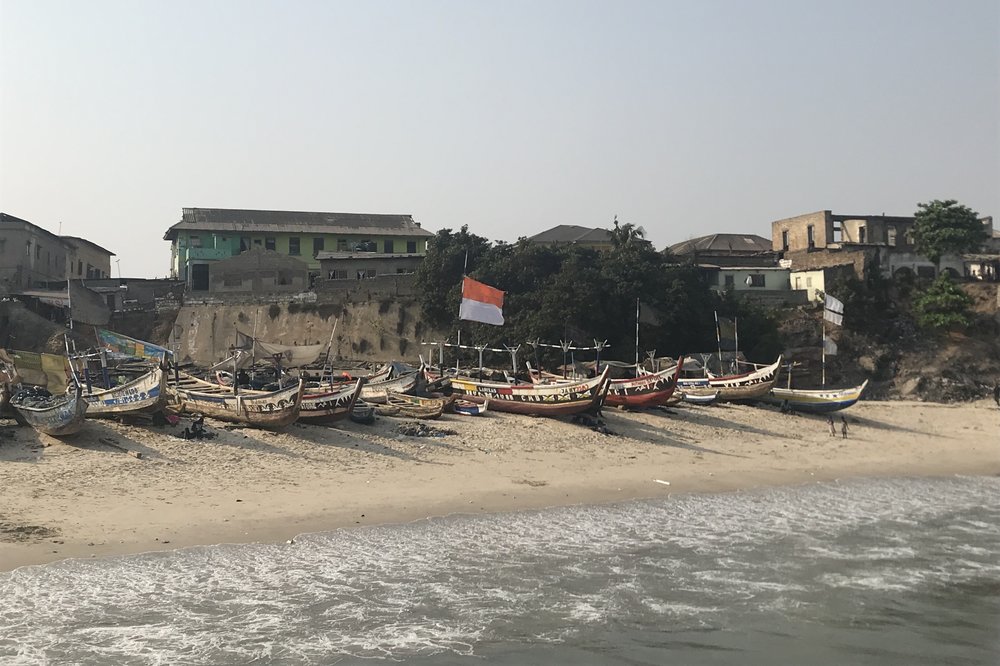
Jamestown fishing harbour – Boats
As it turns out, Emmanuel was also the headmaster of a makeshift school that he had set up on the beach, in order to educate the children of these marginalized fishermen.
As Emmanuel told me, most of these children are deprived from schooling and are instead tasked with working the boats at an early age, so a solid educational foundation from a non-profit school like this would be the only way to give them a brighter future.
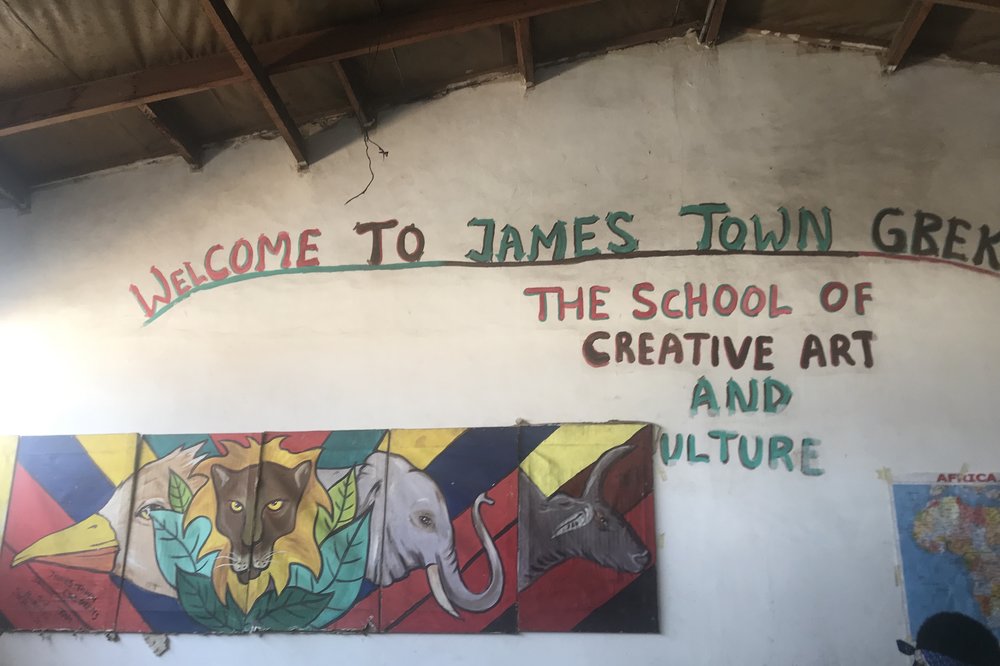
Jamestown fishing harbour – Non-profit school
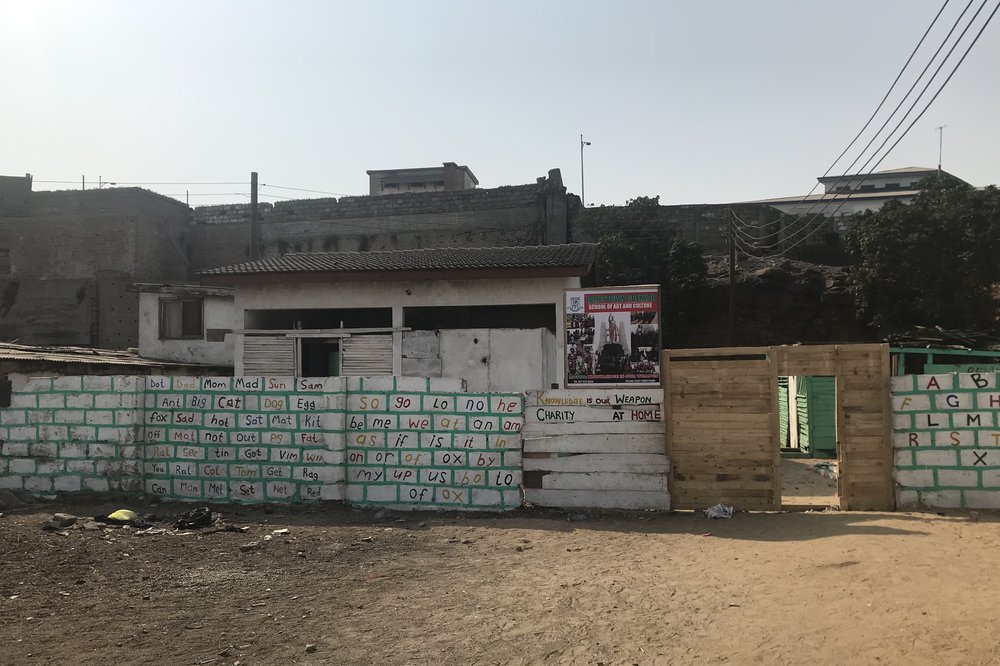
Jamestown fishing harbour – Non-profit school
After making our way back to solid ground, our tour continued with visits to several of the old colonial forts. The old Dutch fort, known as Ussher Fort, had now been converted into a makeshift football pitch and graffiti gallery, while another fort (I believe it was the German one) was now also being used as a non-profit school for the local community.
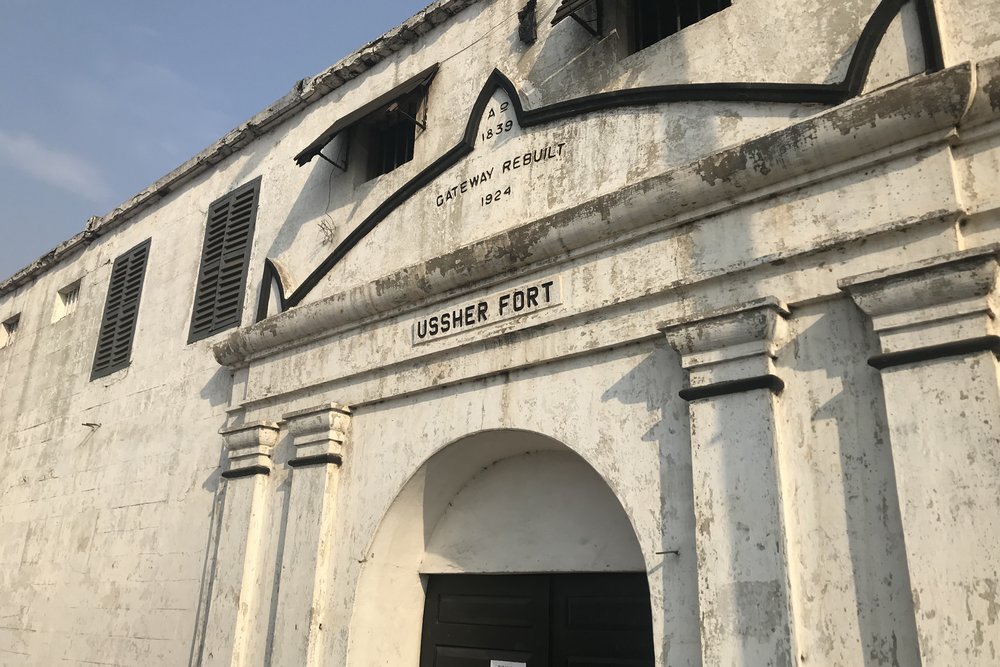
Ussher Fort
Around this point, we also met two other travellers, who, upon noticing my obviously foreign face, expressed interest in joining our tour. It was funny: we then walked through some of Jamestown’s streets and back-alleys, and all I heard from the locals were shouts of “China! China!” and “How are you!””
I guess they see the occasional white traveller around here, but very rarely a Chinese one. Of course, as soon as I became overly friendly with one of the children, he started asking me for money, so pretty soon I learned to flash a wide grin and keep walking.
We finished off the tour by sharing some beers near the Jamestown Lighthouse. It turns out that the other guys, Mike and Jürgen, have a travel website as well, and you can feel free to check out their For 91 Days blog for their impressions of that day in Accra!
After touring the Jamestown district, Kennedy brought me to Accra’s most significant national point of interest: the Black Star Square, which includes a monument with a four-sided Black Star sculpture on top, and the huge city square where all the national celebrations are held and foreign dignitaries welcomed.
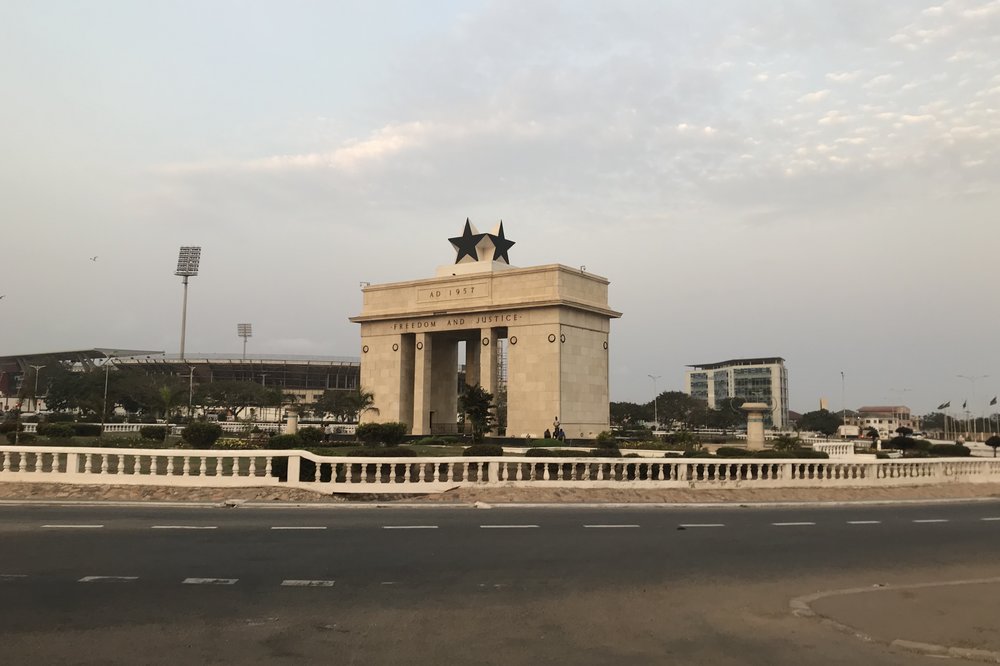
Black Star Square
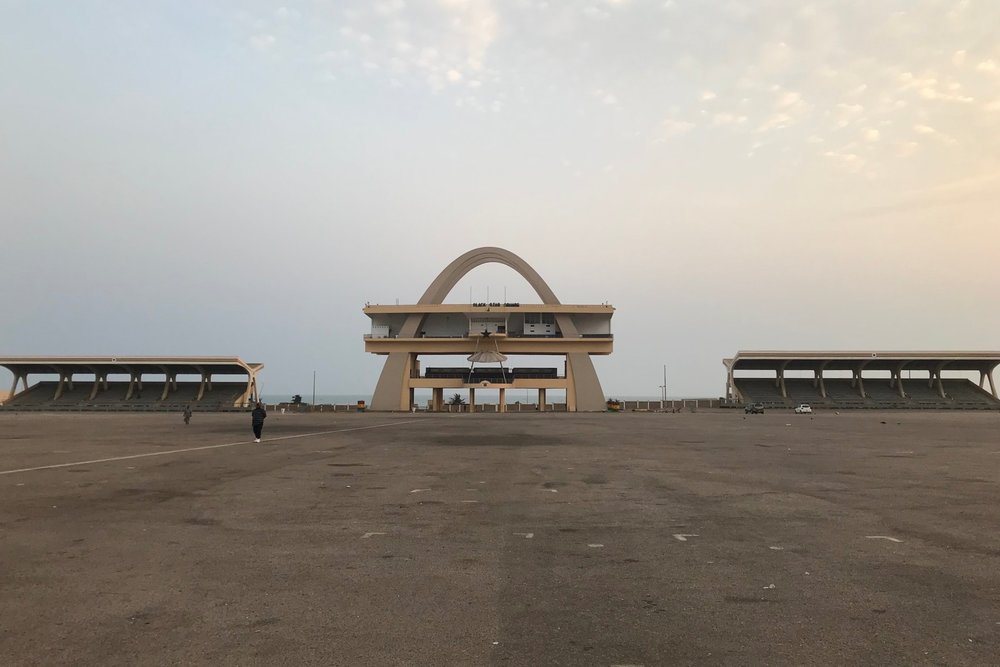
Black Star Square
Our visit to Black Star Square inspired a bit of conversation on Ghana’s role in the world as we went to grab dinner. It’s one of the leading West African nations alongside Nigeria (which Kennedy described as “having more people and being less friendly” – I guess I’ll have to see about that when I visit!), and enjoys a relatively high ranking in the region for things like education and human development. Ghana also benefits from a having a highly democratic government, with nothing but peaceful transitions of power throughout its history, as well as low levels of corruption.
Of course, as with any developing country, it still has its fair share of problems to solve – the scenes we had witnessed in Jamestown were a prime example. Nevertheless, I got the impression that Ghanaians took a huge amount of pride in the peace and prosperity of their nation, which made me feel happy that I had chosen to come here.
For dinner, we hit the street food stand and indulged in banku (fermented corn and cassava dough) with grilled tilapia drenched in Ghanaian chilli sauce, which was certainly the best meal I had on this trip. If I weren’t taking another dozen or so flights on my round-the-world trip after Ghana, I definitely would’ve brought home as many bottles of that delightful chilli sauce as I could get my hands on!
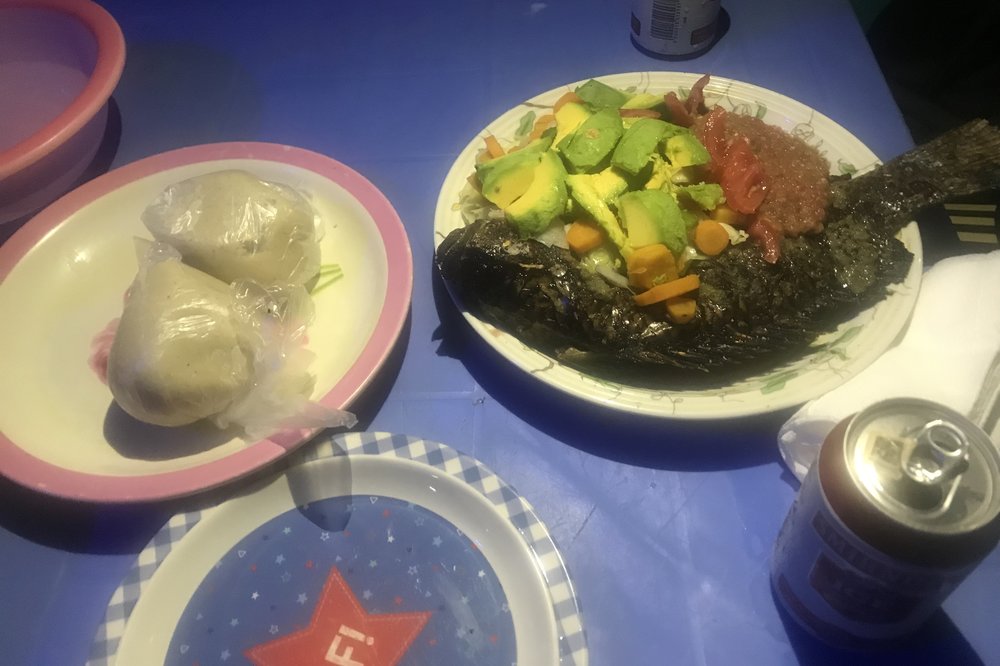
Ghanaian street food for dinner
Day 3: Labadi Beach – The Beach!
Sunday, of course, is God’s day in Christian-majority Accra. But after that, it’s Beach Day.
Every person I talked to at the hotel had asked me if I was going to be here until Sunday, because that’s apparently when everyone in Accra hits the beach to hang out with friends, relax with a few drinks, and generally have fun in the sun and unwind at the end of the week. I loved the sound of that, so was looking forward to taking part in this quintessential Accra experience before my 9pm departure that night.
The main beach is known as Labadi Beach, but also “La Beach” for short. We arrived early at around 1pm before the crowds poured in, taking up a spot under the umbrellas with a few rounds of kebab and beer.
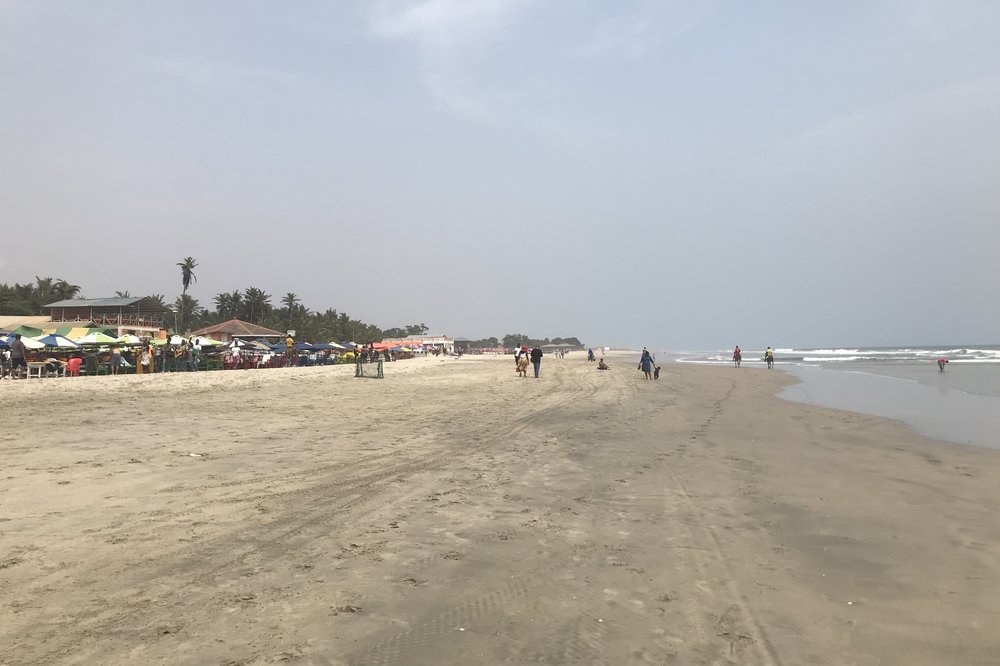
Labadi Beach
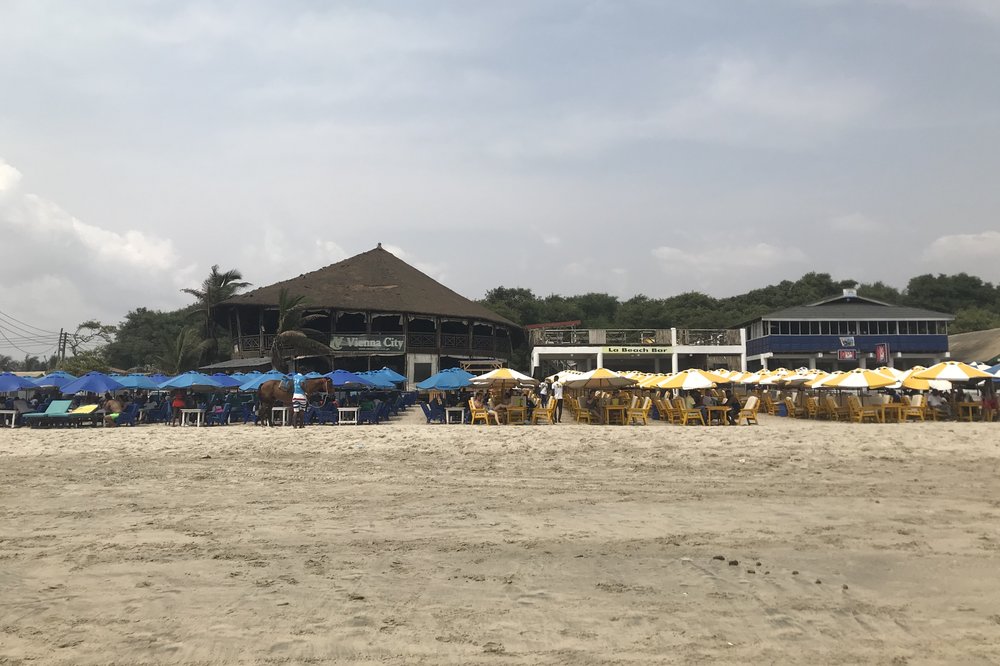
Labadi Beach – Restaurants and bars
Kennedy’s friend joined us later on and we just sat around to chat for a few hours. If you’re a tourist, hawkers will try to sell you all sorts of knick-knacks, but it’s easy enough to wave them away. There are also about a dozen young guys walking around with horses, offering horseback rides to anyone who looks in their direction.
The three of us decided “why not?” and negotiated three horseback rides for 20 Ghanaian cedis ($4), which felt like a pretty sweet deal. The horseback ride itself wasn’t anything special – a simple lap around the length of the public beach – except for the final stretch when the guy let me guide the horse left and right on my own.
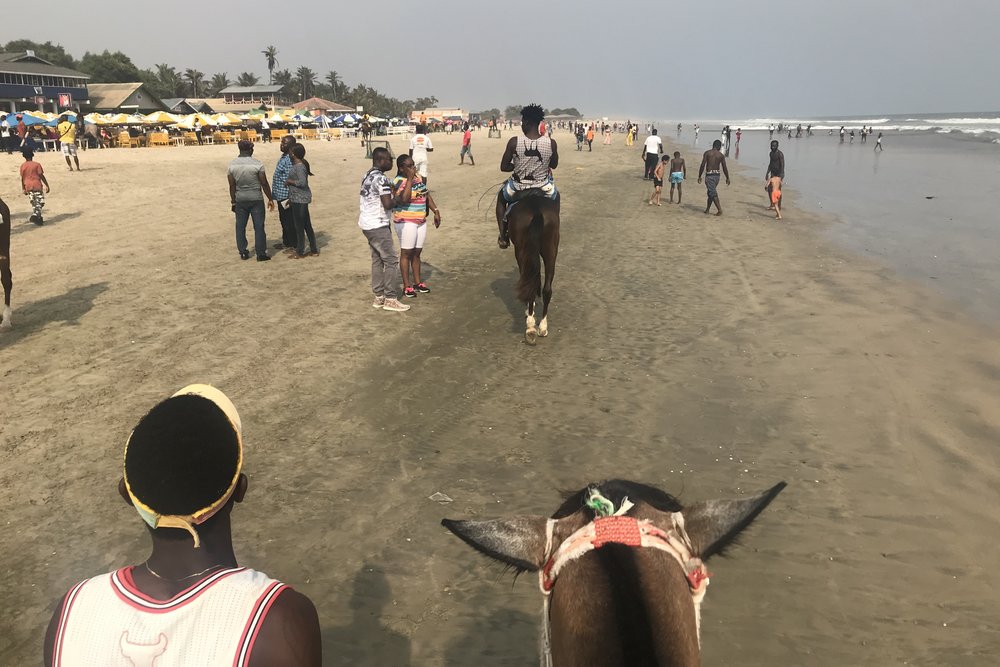
Labadi Beach – Horseback riding
Let’s be real here: there’s no pristine white sand at Labadi Beach or anything like that. It’s loud, boisterous, and gets pretty dirty as the Sunday drags on. But the Beach Day is pretty much a cultural institution here in Accra at this point, so if you’re coming to town, make sure to schedule your trip around a Sunday in order to fully experience it.
At around 5pm, Kennedy and I polished off a final few kebabs and made our way back to the airport. I won’t lie, I was pretty sad to be leaving Accra after spending three incredibly eye-opening days in town.

Kotoka International Airport
I bid goodbye to Kennedy, letting him know of my immense gratitude for spending his weekend as my tour guide, and then checked in for my flights to Istanbul and then onwards to Singapore and then Perth.
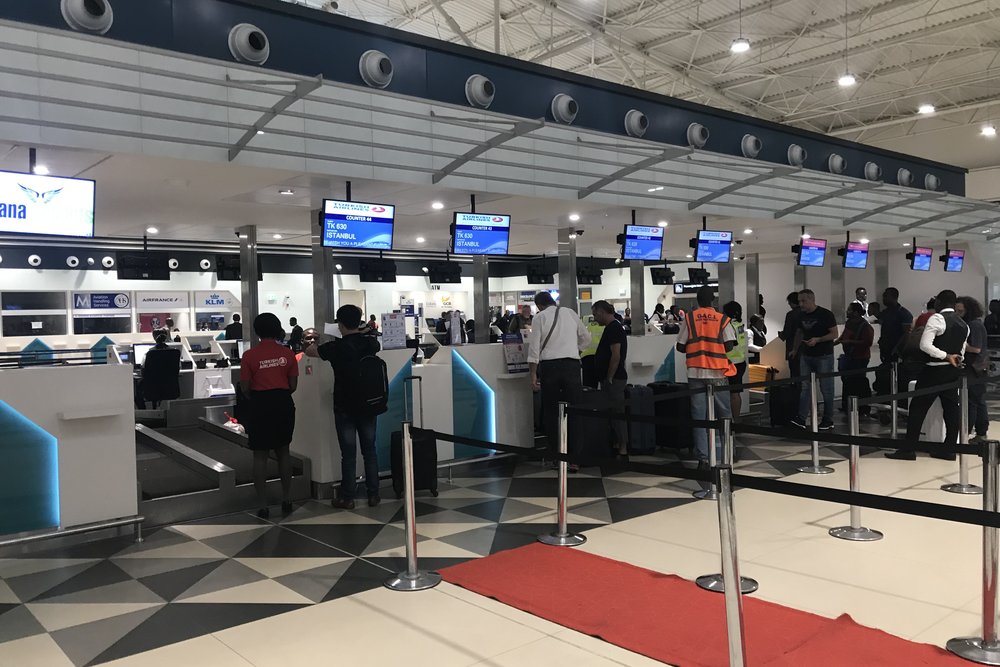
Kotoka International Airport – Turkish Airlines check-in
And after catching up on some work in the airport’s Akwaaba Lounge, I boarded the Turkish Airlines 737 and took off into the West African night. As I looked down on the lights of the Accra city sprawl, picking out the various places I had briefly gotten to know, I couldn’t help but wonder when I’d be coming back.
Conclusion
I’m confident that I made the right decision in choosing Accra as my first port of call in Africa. From losing my head at the Republic, to basking in the city-wide relaxed vibes of Labadi Beach, to – oh man – the unforgettable taste of fresh grilled tilapia smothered in that addicting chilli sauce, I leave Ghana with many good memories.
On the other hand, seeing the downtrodden folks of the Jamestown fishing harbour left me with plenty to reflect on, and I hope to make the tiniest difference by sharing their stories and encouraging you, too, to pay them a visit. (If you’re going to Ghana, let me know and I’ll try to put you in touch with Emmanuel!)
Above all, visiting Ghana taught me that while we all have pre-conceived notions about the world, they exist merely to be vanquished through the act of travelling. It’s ambitious, I know, but I hope to return to Accra one day, since there’s still so much left to do; however, above all, I’m excited to return to Africa and discover more of the continent along my future travels.







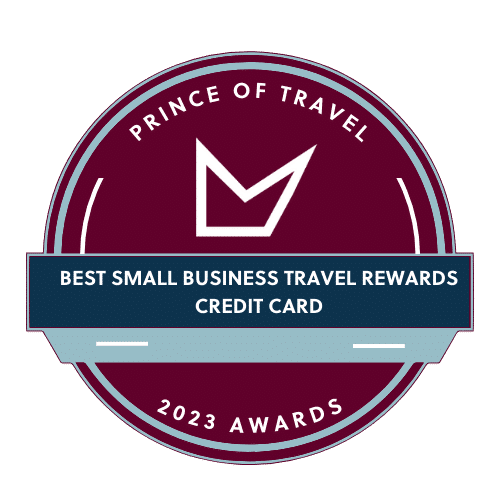

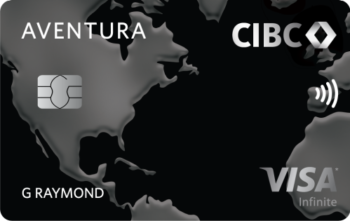


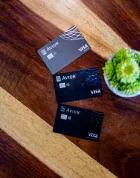
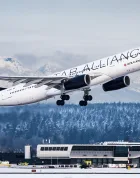
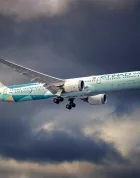


hey around this time my wife and I (with the IOM / UN) were stationed in Sudan for about a month.
It’s really not that bad once acquainted 🙂
"At the same time, though, I’m obviously wary of safety along my travels, so I’m not going to waltz into Sudan or the DR Congo with my DSLR camera around my neck"
At that time Sudan was an embargoed country with U.S. and U.K. sanctions so being there had it’s restrictions including the fact that you couldn’t use credit cards or ATM’s although as of 2017 the sanctions were lifted and now I see that there is more options.
It was my first time to see the infamous Nile River (Two of them actually ..since the ancient city of Khartoum is where the blue and white nile meet! Also enjoyed the national museum.
Did you know that Sudan has the most pyramids; way more than Egypt but due to the lack of tourism and investment most people don’t know that.
Being there was interesting and so close to the Sahara desert we witnessed sand spilling into the city regularly and covering up the streets. Actually due to the lack of technology and the sand; I got a ‘Indiana Jones 1930’s ‘ feel to things. The City itself is an ancient one with continuous habitation for Thousands of years.
There is some pretty cool buildings there and we enjoyed a buffet lunch a couple times at the Corinthian hotel overlooking the Nile.
https://goo.gl/maps/7BvsP5SEw7w9SQw1A